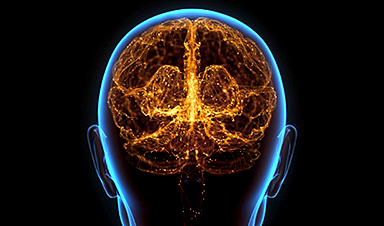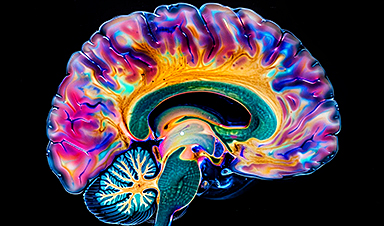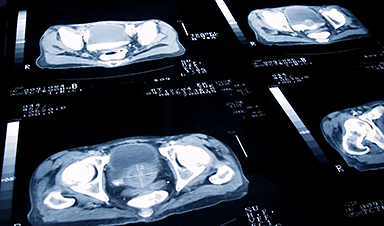Summary: A new study suggests COVID-19 may deplete testosterone levels in males. Findings reveal as testosterone decreased, the severity of coronavirus increased. Men who died from coronavirus infection had significantly lower mean testosterone than those who recovered. For those who were asymptomatic, 65.2% reported a loss in libido.
Source: Taylor & Francis Group
For the first time, data from a study with patients hospitalized due to COVID-19 suggest that the disease might deteriorate men’s testosterone levels.
Publishing their results in the peer-reviewed journal The Aging Male, experts from the University of Mersin and the Mersin City Education And Research Hospital in Turkey found as men’s testosterone level at baseline decreases, the probability for them to be in the intensive care unit (ICU) significantly increases.
Lead author Selahittin Çayan, Professor of Urology, states that while it has already been reported that low testosterone levels could be a cause for poor prognosis following a positive SARS-CoV-2 test, this is the first study to show that COVID-19 itself depletes testosterone.
It is hoped that the development could help to explain why so many studies have found that male prognosis is worse than those females with COVID-19, and therefore to discover possible improvement in clinical outcomes using testosterone-based treatments.
“Testosterone is associated with the immune system of respiratory organs, and low levels of testosterone might increase the risk of respiratory infections. Low testosterone is also associated with infection-related hospitalisation and all-cause mortality in male in ICU patients, so testosterone treatment may also have benefits beyond improving outcomes for COVID-19,” Professor Çayan explains.
Image Credit: Amanda Scott/Envato
Post by Amanda Scott, NA CEO. Follow her on twitter @tantriclens
Thanks to Heinz V. Hoenen. Follow him on twitter: @HeinzVHoenen
News
False Memories Under Fire: Surprising Science Behind What We Really Recall
New research challenges the ease of implanting false memories, highlighting flaws in the influential “Lost in the Mall” study. By reexamining the data from a previous study, researchers found that many supposed false memories [...]
Born Different? Cambridge Scientists Uncover Innate Sex Differences in Brains
Cambridge researchers found that sex differences in brain structure exist from birth, with males having more white matter and females more grey matter, highlighting early neurodiversity. Research from the Autism Research Centre at the University [...]
New study shows risk factors for dementia – virus causes deposits in the brain
Research into the causes of Alzheimer's is not yet complete. Now a new study shows that head trauma can activate herpes viruses and promote the disease. Frankfurt am Main – As a neurodegenerative disease, [...]
Are Machines Truly Thinking? Modern AI Systems Have Finally Achieved Turing’s Vision
Modern AI systems have fulfilled Turing’s vision of machines that learn and converse like humans, but challenges remain. A new paper highlights concerns about energy consumption and societal inequality while calling for more robust [...]
The Surprising Link Between Smell, Sound, and Emotions
New research reveals how smell and hearing interact in the brain to drive social behavior, using mouse maternal instincts as a model. Imagine you’re at a dinner party, but you can’t smell the food [...]
Brain cells age at different rates
As our body ages, not only joints, bones and muscles wear out, but also our nervous system. Nerve cells die, are no longer fully replaced, and the brain shrinks. "Aging is the most important risk factor [...]
Long COVID Breakthrough: Spike Proteins Persist in Brain for Years
Researchers have discovered that the SARS-CoV-2 spike protein persists in the brain and skull bone marrow for years after infection, potentially leading to chronic inflammation and neurodegenerative diseases. Researchers from Helmholtz Munich and Ludwig-Maximilians-Universität (LMU) have [...]
Water-Resistant Paper Could Revolutionize Packaging and Replace Plastic
A groundbreaking study showcases the creation of sustainable hydrophobic paper, enhanced by cellulose nanofibres and peptides, presenting a biodegradable alternative to petroleum-based materials, with potential uses in packaging and biomedical devices. Researchers aimed to [...]
NIH Scientists Discover Game-Changing Antibodies Against Malaria
Novel antibodies have the potential to pave the way for the next generation of malaria interventions. Researchers at the National Institutes of Health (NIH) have identified a novel class of antibodies that target a previously unexplored region [...]
Surprising Discovery: What If Some Cancer Genes Are Actually Protecting You?
A surprising discovery reveals that a gene previously thought to accelerate esophageal cancer actually helps protect against it initially. This pivotal study could lead to better prediction and prevention strategies tailored to individual genetic [...]
The Cancer Test That Exposes What Conventional Scans Miss
Researchers at UCLA have unveiled startling findings using PSMA-PET imaging that reveal nearly half of patients diagnosed with high-risk prostate cancer might actually have metastases missed by traditional imaging methods. This revelation could profoundly affect future [...]
Pupil size in sleep reveals how memories are processed
Cornell University researchers have found that the pupil is key to understanding how, and when, the brain forms strong, long-lasting memories. By studying mice equipped with brain electrodes and tiny eye-tracking cameras, the researchers [...]
Stanford’s Vaccine Breakthrough Boosts Flu Protection Like Never Before
Stanford Medicine researchers have developed a new method for influenza vaccination that encourages a robust immune response to all four common flu subtypes, potentially increasing the vaccine’s efficacy. In laboratory tests using human tonsil [...]
Water’s Worst Nightmare: The Rise of Superhydrophobic Materials
New materials with near-perfect water repellency offer potential for self-cleaning surfaces in cars and buildings. Scientists from Karlsruhe Institute of Technology (KIT) and the Indian Institute of Technology Guwahati (IITG) have developed a surface [...]
Japanese dentists test drug to help people with missing teeth regrow new ones
Japanese dentists are testing a groundbreaking drug that could enable people with missing teeth to grow new ones, reducing the need for dentures and implants, AFP recently reported. Katsu Takahashi, head of oral surgery at [...]
An AI system has reached human level on a test for ‘general intelligence’
A new artificial intelligence (AI) model has just achieved human-level results on a test designed to measure "general intelligence." On December 20, OpenAI's o3 system scored 85% on the ARC-AGI benchmark, well above the previous AI best [...]






















